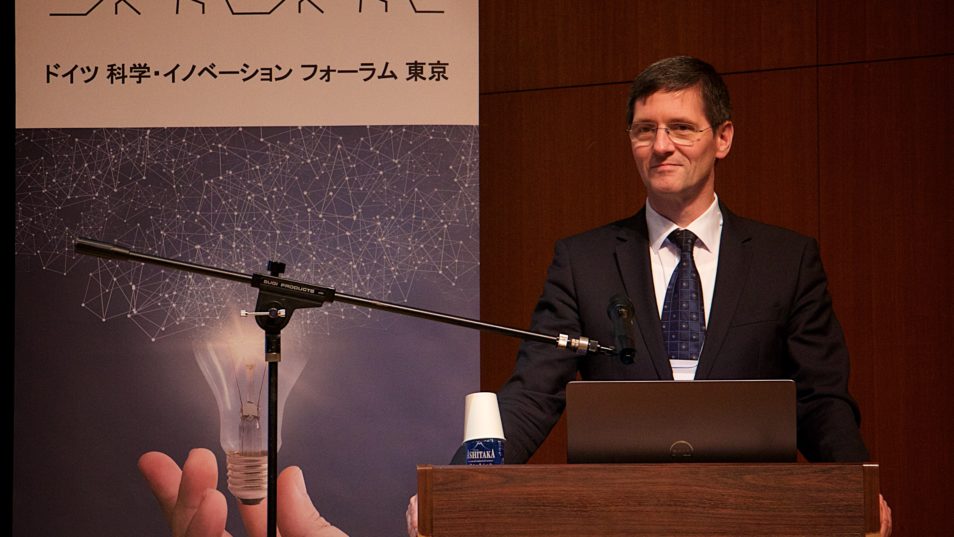Trilateral commitment to ensuring the highest quality in AI systems for patients and healthcare professionals
 © DWIH Tokyo
© DWIH Tokyo
Prof. Dr. Klaus Juffernbruch holds a Professorship for Health & Social Management at FOM University, Germany and acts as President of the Expert Group “Intelligent Networks in Healthcare” at the German National Digital Summit.
He chaired sessions on “AI Applications in Healthcare” at a Japanese-German-French AI symposium in November 2018 (symposium report) and on “Quality Standards for AI Applications in Healthcare” in a follow-up trilateral forum on AI and Healthcare in December 2019 (forum website). In this interview Prof. Juffernbruch shares his findings from discussions with experts from Japan, Germany and France and what he learned during the events.
DWIH Tokyo (Q1): In the role of the Chair you facilitated forum sessions on “Quality Standards for AI in Healthcare” and “AI Applications in Healthcare”. Based on the panel discussion with experts from Japan, Germany and France, how would you summarise your findings? What was new for you?
Prof. Juffernbruch: All of the three countries acknowledge the importance of artificial intelligence in healthcare and are committed to ensuring the highest quality in AI systems for patients and healthcare professionals.
It was encouraging to see that we have the same underlying values regarding performance quality, data privacy, cyber security, medical benefits and ethical guidelines.
DWIH Tokyo (Q2): Linked to your session topics where do you see joint challenges for Japan, Germany and France and what fields did you identify for potential collaboration in a trilateral setting, whether small or large in scale?
Prof. Juffernbruch: Having the aforementioned underlying common values is an ideal basis for potential collaboration.
Similar efforts are underway or planned in all three countries. Some of these efforts overlap in their scope, while others are complementary. Both Germany and France are working on big medical databases. In France, they have SNDS for health administrative data and have started work on a health data hub that also includes medical data. Germany is running the Medical Informatics Initiative, which strives for data interoperability between all university hospitals. Projects in Japan faced the same issues as Germany and France when it comes to unifying data formats and granularity, as well as accuracy of monitoring data.
France has a focus on solutions for use by patients and is especially interested in a specific evaluation for access to reimbursement. They also have developed an approach for continuous monitoring of AI systems that involves regular checks of system output by humans.
With the Digital Care Act, Germany wants to provide health apps to patients for reimbursement and is also working on a process for evaluating these applications. The use of automated ongoing quality assurance using standardized APIs for continuous monitoring is being discussed.
Japan favours giving medical doctors final accountability in the decision-making processes of medical practice, while at the same time acknowledging the need for consensus on sharing responsibility between the medical doctor and the manufacturer.
Both the overlapping and complementary efforts provide opportunities to reap synergies and should therefore be considered for trilateral collaboration.
DWIH Tokyo (Q3): Shortly after the forum, you also attended a closed Expert Workshop on AI and Healthcare and TechBIZKON III: Digital Health beyond 2020. What connections did you make between the events in terms of discussions and insights and where do you see the benefit of cross-communication with different target groups in these settings?
Prof. Juffernbruch: These three events were a perfect fit. The conference provided the big picture and presented new and innovative ideas. The workshop enabled a deeper dive into those ideas and helped to generate concrete next steps in developing joint trilateral programmes and solutions. TechBIZKON was all about healthcare start-ups that can potentially benefit from programmes and solutions and bring ideas to life as a product.
DWIH Tokyo (Q4): What did you and your co-chair learn from each other during the preparations for the two events and the sessions that you chaired together?
Prof. Juffernbruch: Big, comprehensive databases of medical data are an indispensable prerequisite for training and evaluation of AI systems in healthcare. Creating a joint database would provide a very powerful tool for AI researchers, companies and regulators. Therefore the two workstreams of the conference are closely intertwined.
The preparations for the sessions and events with my co-chair, the speakers and the organizers provided me with new insights on the various aspects of the topics and were a real pleasure.
DWIH Tokyo (Q5): What would be your appeal to fellow speakers and the experts in the forum audience?
Prof. Juffernbruch: The forum made it evident that AI in healthcare is still in its infancy. Therefore, we need to undertake ongoing and strong efforts to find new applications for AI, ensure their safety and validity for patients and healthcare professionals, and provide a regulatory environment that facilitates these processes. Japan, France and Germany have all the prerequisites to do so, and everyone working in the field should contribute to joining forces in order to speed up progress and make the solutions more powerful, effective and safe.
Further documentation material on the “Japanese-German-French Forum on AI and Healthcare”:
- Report about the forum
- Interviews with the Chair of the sessions “Joint Database on Medical Data”, Dr. Kazuhiro Sakurada
- Photo gallery of the conference (©DWIH Tokyo)
- Video (livestream) of the forum
